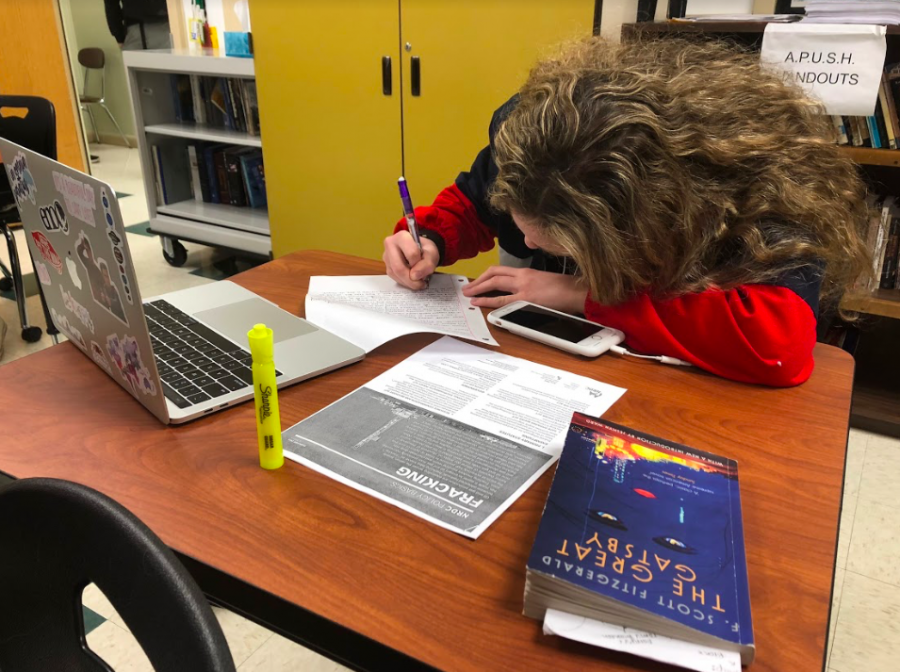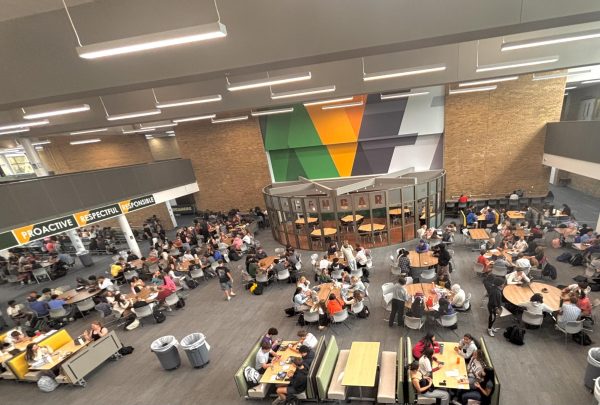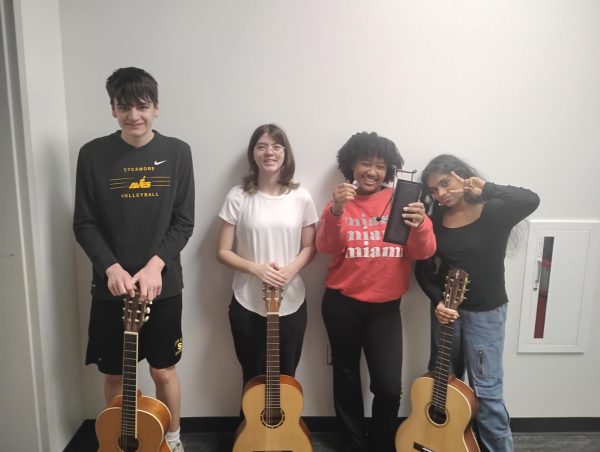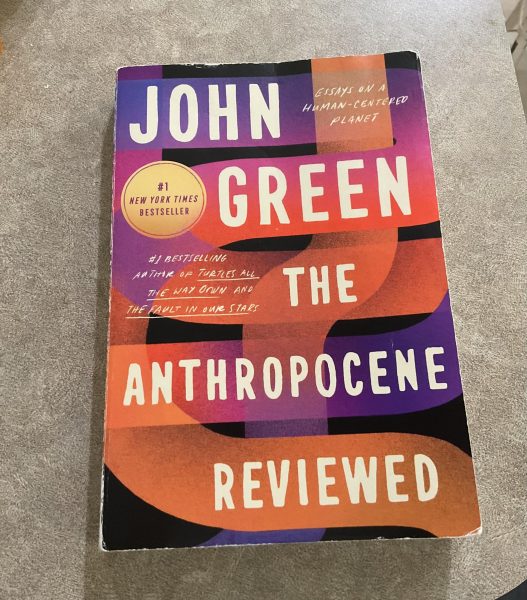F is for ‘fractivism’
Students take action on fracking
WRITE ON. Sophomore Current World Issues (CWI) student Kyra McHugh works on her letter to Ohio Senators Rob Portman and Sherrod Brown. CWI teacher Mrs. Valerie Nimeskern recommended that students write at least two paragraphs in their letters, but some ventured so far as to write five.
This is history teacher Mrs. Valerie Nimeskern’s first semester teaching Current World Issues (CWI)—just one bell alongside her four bells of Advanced Placement U.S. History (APUSH).
CWI is an elective designed to teach students to examine political, economic, social, historic and geographic issues. When Nimeskern’s second bell class began its foray into environmental studies, the longtime teacher came across “Gasland,” a groundbreaking (no pun intended) 2010 documentary that investigates the impacts of hydraulic fracturing, or fracking, in America.
Fracking is a method of releasing natural gas by drilling vertically into the ground and pumping a pressurized cocktail of water and chemicals, some of which are carcinogens and pollutants (used to make the process more effective), into shale rock.
When the gas flows to the surface, it brings some of these chemicals with it. Due to a legislative loophole, the Environmental Protection Agency (EPA) currently does not regulate fracking fluids even when they infiltrate water supply systems. Notably, the process of hydraulic fracturing also requires immense amounts of water.
In his documentary, filmmaker Josh Fox travels across the most heavily-fracked parts of the country, getting to know citizens who live near oil or gas wells, setting natural-gas-contaminated tap water on fire, collecting and testing contaminated water samples, interviewing scientists, and interrogating politicians who have given breaks to oil and gas corporations.
Many of the Americans Fox meets throughout the film (along with their pets and animals) are experiencing health issues that arose shortly after gas companies began drilling near their homes. The tap water in most of these homes is contaminated with natural gas and/or fracking chemicals to the point where it is undrinkable and, in some cases, black in color.
“I’ve found myself, an adult American who generally knows what’s going on in America, as being pretty uninformed when it came down to this issue of fracking. I’ve heard this word in the news, and we’ve seen it in the papers, but I really never investigated truly what fracking was,” Nimeskern said.
“In teaching this class and looking at environmental issues, finding the documentary ‘Gasland,’ my eyes were opened up, kind of—I was horrified at what was happening around our country to our environment, to the people living within it, the wildlife, the air we breathe and the water we drink, and it’s horrific to me.”
So on Tues., March 5, Nimeskern gave her class an assignment.
“We wrote [letters] to our senators… to try to get them to introduce legislation—and support it—to punish [oil and gas] companies, [and]… to eliminate the [loophole] that big companies can get through in order to not have to follow the Clean Water Act and try to keep our water clean,” said CWI student Keegan Veraldo, 10.
Veraldo references the many environmental laws that exempt fracking operations from regulations intended to maintain air and water quality in fracked areas.
Students addressed letters to Ohio Senators Rob Portman and Sherrod Brown, asking them to support the reintroduction of and, later, vote in favor of the Fracturing Responsibility and Awareness of Chemicals (FRAC) Act. Nimeskern is also planning to send a copy of each student’s letter to Sen. Robert Casey, who introduced the FRAC Act in 2017 during the 115th session of Congress.
The FRAC Act makes amendments to the Safe Drinking Water Act and creates new legislation, both of which are actions meant to further regulate hydraulic fracturing and require responsibility and transparency of oil and gas corporations.
Most of Eastern Ohio sits above a shale play that has been fracked extensively and is still being drilled for oil and gas today, a fact which makes this issue even more direct to Sens. Brown and Portman as well as Nimeskern and her CWI students.
“A lot of it came from the [fracking] handout that I created… the last question on that handout was ‘what can we do as a class that might help impact the situation,’ and a lot of the responses from the class were ‘write letters to our representatives.’ And that’s what I was hoping [the class] would say,” Nimeskern said.
After the assignment was introduced, Nimeskern helped her students format their letters and gave them some source material to support their thoughts and requests.
“I wrote this letter because fracking is a real problem across not only the Midwest but our entire nation, and I believe that since we’re only in high school and we can’t vote, we can still make a difference by writing to our senators and trying to get them to make a difference for us,” said CWI student Ally Flege, 10.
Flege believes that her class’s letters can and will affect Sens. Portman’s and Brown’s decisions on the FRAC Act.
“We studied all of these human rights violations—human trafficking and child labor—these horrific situations, but I don’t want the whole year to just be about us finding issues and feeling helpless. I wanted to empower us to make some effort to do something—at least have our voice heard, if nothing else,” Nimeskern said.
Watch “Gasland” here.
Sources:
Your donation will support the student journalists of Sycamore High School. Your contribution will allow us to purchase equipment and cover our annual website hosting costs.



![Mock Trial members from Gold and Green team last year pose for a picture in front of the OCLRE building in Columbus. "We all put in so much work [last] year. I know [this] year we’ll come back improved and ready to win!” said Ogunbodede.](https://shsleaf.org/wp-content/uploads/2025/10/IMG_4121-600x411.jpg)





